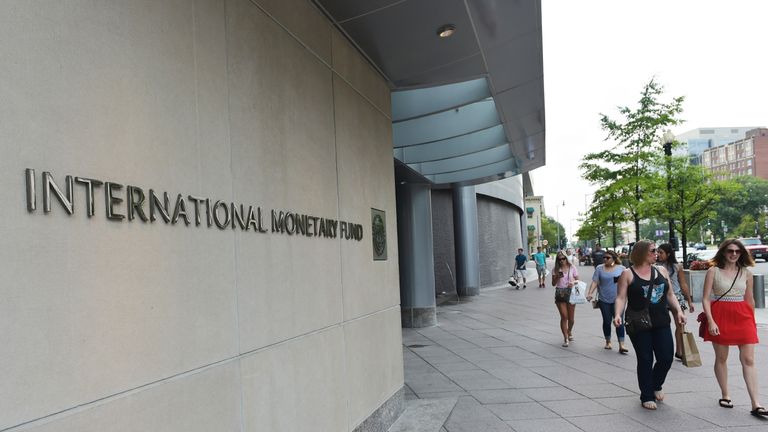The boldest Brexit forecast since before the EU vote
Sky's economics editor Ed Conway says there is some irony in the OECD's predictions of economic doom for a Brexit-bound UK.
Tuesday 17 October 2017 21:03, UK
The AG百家乐在线官网 did not fall in in the months after the EU referendum.
There was no recession. Economic growth remained positive. Wages did not collapse - and nor did the stock markets.
Yes, the pound fell sharply on referendum night, but for all the scary forecasts from Britain's economists, Armageddon this was not.
One upshot was that Britain's cadre of professional forecasters had a crisis of confidence.
Sure, technically speaking they didn't get it all wrong: many of their pessimistic post-Brexit predictions were focused on the very long term - in other words could only be borne out (or not) over a matter of decades - but they were still tarred with the same brush.
A recession was forecast; a recession didn't happen. Ergo no-one can rely on experts' economic forecasts any more.
And so the Treasury went silent on the issue. It has still refused to publish any updated projection of the impact of Brexit - deal, no deal or something in the middle - since last year's vote.
Many independent forecasters were hushed as well. Even the International Monetary Fund was noticeably sotto voce about Brexit in its World Economic Outlook last week.
It left its forecasts for UK growth this year and next unchanged, and tried to say as little about Brexit as possible - save that its managing director
Now the Organisation for Economic Co-operation and Development (OECD) is breaking the silence.
It now expects the UK to grow slower than any other G7 country next year. It thinks Brexit is a full-scale economic disaster, and unlike many other forecasters, it is not afraid to say so.
::
For evidence, look no further than the OECD's latest comprehensive survey of the UK economy, published today. It believes Brexit is already causing damage to the UK economy.
Growth is weaker than the EU and OECD average. Share prices of truly UK-based firms (selling locally, as opposed to the international firms simply listed on the FTSE 100 and 250) have dramatically underperformed their global counterparts.
Of course, Britain had plenty of homegrown issues and challenges long before Brexit came along.
The economy is deeply imbalanced; households are overly reliant on debt and on housing wealth; the productivity rate is too weak; exports are too low and the performance gap between different regions is greater than in most other developed economies.
The OECD has moaned about such things for years. The difference this time around, it says, is that Brexit is actually making them all worse.
Not the prospect of Brexit, mind. The direct economic impact of the vote last year, it says.
So: it says that households are facing a bigger squeeze as a result of post-referendum devaluation/inflation. They are borrowing more to finance their spending. Productivity growth has dropped to new lows in recent quarters. Exports show little sign of rebounding despite the fall in the pound.
Indeed, according to the OECD's analysis, the country's export performance has hit a record low in recent months.
And the very regions of the country facing the biggest productivity shortfall are precisely the areas which are most reliant on EU funding - which could dry up if Britain crashed out of the EU without a deal.
There are some solutions, according to the OECD. But here things get, well, ironic.
For pretty much every one of its major solutions has already been dismissed by the Government itself. So what's the best thing the Government could do to get growth going? According to the OECD: reversing the referendum decision altogether. That's a no-no.
Another idea it suggests (to boost productivity and stop people slipping into low-paid jobs) is introducing new higher National Insurance rates for self-employed workers. As you'll recall, the Treasury already tried to do that in the Budget, and was forced into a hasty u-turn.
Or, it says, the Government could abolish the pensions triple lock and simply raise pensions in line with wage growth, or inflation. Again, no longer an option, following the DUP confidence and supply agreement.
In other words, the OECD report is a significant reminder of the constraints on economic policy at the moment.
There is no recession. But the more data that comes in, the clearer it is that Britain is growing at a weaker rate than previously - and the signs are this is at least partly down to Brexit. And the most obvious solutions are, well, no longer viable.
There is, of course, a chance the OECD has got it wrong. There is a chance its numbers are inaccurate and its analysis is flawed. But even the most sceptical would have to concede that eventually one of these experts might just get something right.





